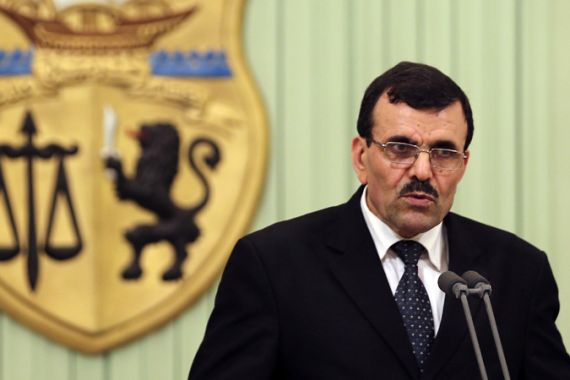Tunisia unveils new coalition government
Prime minister-designate unveils new coalition led by Ennahda Party that will serve until elections later this year.

Tunisia’s prime minister has unveiled his new coalition government led by an Islamist party, after a deal was reached in last-minute talks aimed at ending the country’s political crisis.
Ali Larayedh, the prime minister-designate and the outgoing interior minister, said on Friday the new government, led by the Islamist Ennahda Party, will serve until an election is held before the end of the year.
“I presented to the president the dossier containing the list of the new government and a summary of the government programme,” Larayedh, a member of the powerful Islamist Ennahda party, said on television.
The announcement, just hours before a midnight deadline, came after two weeks of fraught discussions and amid tensions and uncertainty sparked by the killing last month of leftist anti-Islamist politician Chokri Belaid.
The new government is backed by the centre-left Ettakatol party and the secular Congress for the Republic, led by President Moncef Marzouki.
Larayedh said earlier the parties had reached an agreement on a political programme for the new government that would guide its priorities, policies and commitments, according to Marzouki’s office.
Larayedh was tapped on February 22 to head a new government, with a two-week deadline to present his team and government programme to Marzouki. The deadline runs out at midnight on Friday.
The hopes of Larayedh and his ruling Islamist party Ennahda to form a broad-based coalition appeared compromised after three political parties that had been asked to join earlier announced they were pulling out of the talks.
Consequently, only Ennahda and its secular allies in the previous government – Marzouki’s Congress and Ettakatol – actually took part in discussions about the composition of a new cabinet and a proposed government programme.
Key concessions
Ennahda, to which Larayedh also belongs, has made a key concession in accepting that key ministries such as interior and justice be entrusted to independent candidates.
Tunisia has been in a political crisis since the February assassination of leftist politician Chokri Belaid, a vocal critic of the government.
Belaid’s murder led to the resignation of former prime minister Hamadi Jebali after he failed to forge a non-partisan government of technocrats when Ennahda refused to support his efforts.
If a cabinet is not named by Friday night, Marzouki must choose another politician to form a government.
After the president reviews the plan, the new government lineup must be approved by the National Constituent Assembly within three days.
In addition to the political upheaval, violence and attacks blamed on the conservative Muslim Salafist movement have rocked Tunisia in recent months.
There have also been protests sparked by growing unemployment and poverty – the key problems that triggered the 2011 revolution.